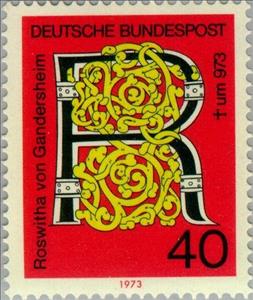Stamp: Gandersheim, Roswitha v. (Germany, Federal Republic 1973)
Gandersheim, Roswitha v. (Germany, Federal Republic 1973)
25 May (Germany, Federal Republic ) within release Gandersheim, Roswitha v. goes into circulation Stamp Gandersheim, Roswitha v. face value 40 German pfennig
| Stamp Gandersheim, Roswitha v. in catalogues | |
|---|---|
| Michel: | Mi:DE 770 |
| Stamp Number: | Sn:DE 1117 |
| Yvert et Tellier: | Yt:DE 620 |
Stamp is vertical format.
Millenary of the death of Roswitha of Gandersheim, Germany’s first poetess: “R” for RoswithaAlso in the issue Gandersheim, Roswitha v.:
- Stamp - Gandersheim, Roswitha v. face value 40;
- Stamp - Kolbe, Maximilian face value 40;
Stamp Gandersheim, Roswitha v. it reflects the thematic directions:
Famous People refers to the fame and public attention accorded by the mass media to individuals or groups or, occasionally, animals, but is usually applied to the persons or groups of people (celebrity couples, families, etc.) themselves who receive such a status of fame and attention. Celebrity status is often associated with wealth (commonly referred to as fame and fortune), while fame often provides opportunities to make money.
In legal discourse, an author is the creator of an original work, whether that work is in written, graphic, or recorded medium. The creation of such a work is an act of authorship. Thus, a sculptor, painter, or composer, is an author of their respective sculptures, paintings, or compositions, even though in common parlance, an author is often thought of as the writer of a book, article, play, or other written work.In the case of a work for hire, the employer or commissioning party is considered the author of the work, even if they did not write or otherwise create the work, but merely instructed another individual to do so.
Commemorations are a type of religious observance in the many Churches of the Anglican Communion, including the Church of England. They are the least significant type of observance, the others being Principal Feasts, Principal Holy Days, Festivals, and Lesser Festivals. Whereas Principal Feasts must be celebrated, it is not obligatory to observe Commemorations. They are always attached to a calendar date, and are not observed if they fall on a Sunday, in Holy Week, or in Easter Week. In Common Worship Commemorations are not provided with collects or indications of liturgical colour. However, they may be celebrated as Lesser Festivals if local pastoral conditions suggest it.



